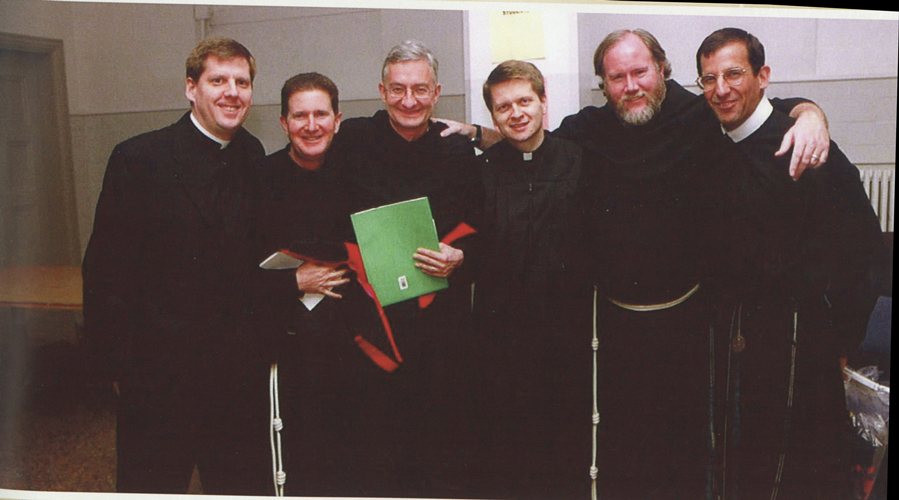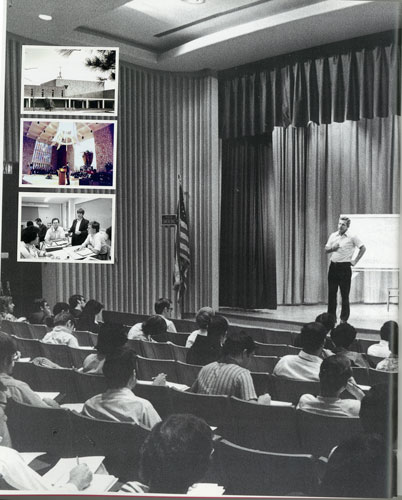The Washington Theological Union
The Washington Theological Union was founded in 1968 with six different religious institutions pooling their resources to form a coalition to provide a Roman Catholic Theological graduate school in the Washington D.C area. While the coalition had changed somewhat over the decades (Oblates of St. Francis de Sales and the Viatorian orders left eventually and were replaced by two other organizations) the most current list of supporting institutions is as follows: Carmelite Fathers (Whitefriars Hall), Congregation of the Sacred Hearts of Jesus and Mary (Sacred Hearts Community), Missionary Servants of the Most Holy Trinity (Holy Trinity Mission Seminary), Order of Friars Minor (Holy Name College), Order of the Friars Minor Capuchin (Capuchin College), and Order of St. Augustine (Augustinian College). These religious communities owned and controlled the school, managing it along with the Union President and the board of Trustees. Their resources maintained the facility along with donations from alumni and tuition from students. Their physical facilities were also the core of the Union’s school grounds and physical resources. For example, instead of the Union having its own central library the University used all six of the sponsoring organizations' libraries. Aside from the library, other buildings formally used by the individual institutions were used by the coalition for various purposes.
The School offered a very specialized curriculum meant to train future church clergy in their later stages of education. There were originally two main degree programs offered at the Union: Master of Divinity and Master of the Arts in Theology. The Master of Divinity program was designed as a program of ministerial preparation with a combination of the traditional theological disciplines and pastoral field experience. Master of the Arts in Theology was viewed as the first graduate degree for those whose main ministry was to teach theology or religious studies and who may have continued with formal studies leading to a doctorate in theology. These were the two main degree programs offered at the union when it was first established. Since then there have been other degrees offered but these remained the two principle degrees which people enrolled in until the closing of the school.
Being a graduate school of respectable quality, the Union had a list of requirements in order to be considered for admission. First, a prospective student had to already possess a bachelor’s degree from an accredited college or university. Second, they must have completed an undergraduate program with Liberal Arts orientation. Third, they must have held a GPA of 2.5 or higher (on the 4.0 scale) as a cumulative score. Fourth, they must have taken Graduate Record Examinations which indicate that they have an aptitude for the successful pursuit of graduate studies. Lastly, they must have completed at least eighteen semester hours of Philosophy, including six hours of History of Philosophy and six hours of Contemporary Philosophy. A prospective student would be considered if they met or exceeded all of these requirements. Requirements for attaining a degree for the two main programs offered at the Union were: For Master of Divinity students (A) successfully complete 84 credit hours of course work. (B) Complete a pastoral internship consisting of full-time supervised ministry for at least ten weeks. (C) Write an acceptable major pastoral reflection paper. (D) Lastly, pass a comprehensive examination which focuses on six areas of theology related to the pastoral reflection paper. For the Master of the Arts in Theology program: (A) Successfully complete 54 hours of course work. (B) Have concentration in one of six areas of theology. (C) Possess a reading proficiency in either French or German. (D) Write either a dissertation or two major research papers in the chosen area of concentration. (E) Lastly pass a comprehensive examination which will be administered in two segments.
Being such a small institution and offering such a specialized list of programs guaranteed that the university accomplished what it set out to do by preparing many men and women for positions within the clergy of the Roman Catholic Church. Unfortunately this small size would also make things financially difficult in the long run for the Union due to the heavy reliance on enrollment for income.
As the decades passed the makeup of the student body gradually changed from those sent to the Union by their religious institutions which sponsored their member’s academic pursuits making up the majority of the student body to mostly laity whom needed financial aid in order to attend. While these students earned their place at the Union and by and large went on to achieve success in their chosen fields, the amount of financial aid given out became burdensome for the university whose means were never truly extraordinary due to its small size. In other words enrollment (which was gradually shrinking due to competition in the area and a diminishing number of applicants) was no longer sufficient to support the Union financially.The leaders of the University attempted many different courses of action to rectify the situation.
This ranged from lowering financial aid offered, raising tuition, and more aggressively marketing themselves, to becoming more dependent upon donations from alumni and other sponsoring institutions. The Union also started a summer program independent of the Fall and Spring programs in an attempt to increase enrollment. While this managed to slow the financial decline of the university it was sadly not enough to save the university and, in 2010, after much consideration the leaders of the Washington Theological Union decided to cut off new enrollment and in 2012 closed the Union altogether. While this is an unfortunate state of affairs, the staff of the University take pride in the thousands of men and women who benefited from the school and went on to attain success in the clerical field. The Union now participates in seminars and workshops still contributing as they can to the cause of theological education.
After the school closed, their documents were transferred to St. Bonaventure University so that their records would be kept safe and so that Union's history, mission, and accomplishmentswould be preserved. The archival collection is made up of 55 cubic feet of material including 44 boxes. The student records are not part of the archival collection but housed elsewhere on SBU's campus. Dissertations from the final years of the program are included in the archives' material.
- The permanent collection is made up of:
- Association of Theological Schools Documentation,
- Institutional Strategic Objectives/Plans,
- Faculty Senate Appointments/Minutes,
- Faculty Senate Programs/Committees
- DMin background ATS,
- Institutional Catalogs/Directories
- Course Syllabi dating between 1968 and 1999
- Lilly Grant Documents, Lilly Grant Financial Information
- Miscellaneous Other Grants
- Audio Visual Materials
- Corporate Religious Order Documentation
- American Academy of Franciscan History
- Religious Order Financial Giving
- Institutional Publications/Newsletters
- The Degheri Library Bequests
- Institutional Corporate Documents/By-Laws
- Board of Trustees Minutes (1968-2012)
- Faculty Handbook Institutional Legal Correspondence
- Graduation Programs
- Accreditation Files (ATS & DC Office of Education)
- Directories (Faculty [FT/PT] and Students)
- Board of Trustees Membership Information
- Doctor of Ministry Theses (in the archives' collections)
- Miscellaneous Items.
The collection has officially been part of the SBU archives since July 1st, 2015.
This web site was created by William Friel as part of History 495, History Intership, during the Spring 2017 semester.
For information about the
Archives' collections contact:Archivist
(archives@sbu.edu)
telephone: 716.375.2322

